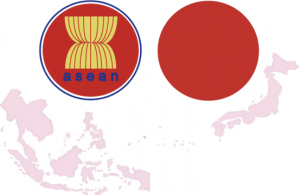 PHNOM PENH, 24 June 2015 – ASEAN and Japan Senior Officials participating in the 30th ASEAN-Japan Forum reaffirmed the importance of ASEAN-Japan Strategic Partnership and agreed to explore new opportunities to further strengthen the relationship and enhance cooperation. The forum was held in Phnom Penh on 22 June. The Senior Officials also discussed regional and international issues of common interest and concern and agreed to work together to address emerging challenges and promote peace and stability.
PHNOM PENH, 24 June 2015 – ASEAN and Japan Senior Officials participating in the 30th ASEAN-Japan Forum reaffirmed the importance of ASEAN-Japan Strategic Partnership and agreed to explore new opportunities to further strengthen the relationship and enhance cooperation. The forum was held in Phnom Penh on 22 June. The Senior Officials also discussed regional and international issues of common interest and concern and agreed to work together to address emerging challenges and promote peace and stability.
The forum took stock of the progress in ASEAN-Japan relations, particularly since the momentum set by the Leaders during their Special Summit on the occasion of the 40th anniversary of ASEAN-Japan relations in 2013. Japan remains ASEAN’s third largest trading partner and second biggest source of foreign direct investment.
Cooperation has also been strong and vibrant in other fields. For instance, Japan is a leading partner in enhancing regional connectivity with a list of 70 flagship projects to help implement the Master Plan for ASEAN Connectivity. Japan has been actively working with ASEAN in addressing climate change and natural disasters through substantial financial and technical support to strengthen the ASEAN Coordinating Centre for Humanitarian Assistance on disaster management (AHA Centre). A large number of activities and projects have been implemented or ongoing under the newly established Japan-ASEAN Integration Fund (JAIF) 2.0 to the tune of USD100 million to enhance cultural ties and people-to-people contacts.
Both sides recognized the need to look ahead and identify future targets to enhance cooperation and maintain the dynamism of the partnership. On economic relations, ASEAN and Japan agreed to expeditiously conclude negotiations on upgrading the ASEAN-Japan Comprehensive Economic Partnership, and to achieve the targets of the ASEAN-Japan 10-Year Strategic Economic Cooperation Roadmap (2012-2022) to double trade and investment flows by 2022.
ASEAN noted Japan’s initiative to assist ASEAN in promoting prosperity in the region, such as its plan to channel USD110 billion through the Asian Development Bank to finance quality infrastructure development in Asia with ASEAN as one of the priority regions. ASEAN also recognized and expressed appreciation for Japan’s continued support to ASEAN Community-building efforts.
Both sides recognized the implications of the evolving regional and global security environment and agreed to enhance cooperation to promote regional peace and stability. In this regard, ASEAN and Japan emphasized the importance of maintaining peace, stability, freedom and safety of navigation in and over-flight above the South China Sea. Japan reiterated its support for ASEAN’s ongoing efforts to realise full and effective implementation of the DOC and early conclusion of the COC. The two sides also agreed to strengthen cooperation in addressing non-traditional security challenges, particularly transnational crimes including terrorism and extremism, cybercrime, sea piracy and pandemic threats.
